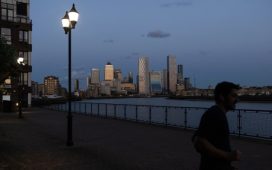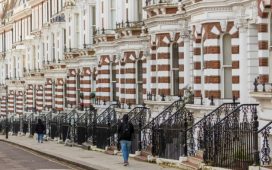Unlock the Editor’s Digest for free
Roula Khalaf, Editor of the FT, selects her favourite stories in this weekly newsletter.
Large London office buildings are proving almost impossible to sell as high interest rates and investor nerves over hybrid working thwart efforts to kick-start dealmaking.
Only a handful of office buildings across London have sold for more than £100mn in the first half of the year, according to property data group CoStar. The City of London has not had any sales of such size, a sharp contrast to when the largest deals in that market once topped £1bn.
GPE and Derwent are among several major office landlords to have tried selling more expensive buildings, but these attempts have mostly fallen through or been quietly scrapped after potential prices fell short of expectations.
The steep rise in interest rates in the past two years has driven a sharp repricing across commercial real estate but especially for office buildings, where investors also face uncertainty over the strength of demand from companies after hybrid working became popular following the pandemic.
Investors who bought central London offices since 2014 would probably have to stomach a loss to sell today, according to an MSCI index. At current prices, 64 per cent of London offices would sell for less than what they were bought for, the MSCI index shows.
At the start of this year, property agents had predicted sales would pick up, driven by a wave of refinancing deadlines.
However, there have been relatively few such transactions due to lower overall leverage levels compared with the 2009 property downturn, a stabilisation of interest rates, albeit at higher levels, and flexibility from lenders.
But office owners now looking to revive the market for bigger transactions from a position of strength are struggling to do so. Recent listings show landlords are still testing out pricing and buyer interest.
Julian Sandbach, head of central London office markets at property advisory group JLL, said: “Owners know that liquidity in a lot size over £150mn is really, really difficult. There will be a whole raft of stuff out there that is not suitable for current market conditions.”

Just £2.5bn of central London offices have changed hands this year, down 28 per cent from the already depressed market last year, the brokerage said.
FTSE 250 office owner Derwent marketed 90 Whitfield Street for about £120mn, while rival GPE tried to sell 1 Newman Street for more than £200mn. Both buildings received bids that fell short of the landlord’s expectations, and the sales have been put on hold, according to people familiar with the deals.
“There is little evidence today of forced selling. There is increasing evidence of motivated selling,” said Toby Courtauld, GPE chief executive, which also recently raised a war chest £350mn for buying opportunities.
Both Derwent and GPE routinely sell established properties to finance new acquisitions and developments. The companies declined to comment on the specific transactions.
Cut-price deals on two larger buildings, 20 Old Bailey in the City and 5 Churchill Place in Canary Wharf, were also cancelled in recent months.
Expectations that the Bank of England will start cutting interest rates in the summer have also strengthened the determination of some sellers not to part with buildings at any price.
“I think the resolve of the sellers is beginning to firm up a bit because we’re probably through the worst,” said Richard Garside, head of central London at Savills.
At the same time, the high cost of debt continues to make it difficult for most buyers to find financially viable deals. Many of the active buyers in the current market are extremely wealthy families who typically buy with little debt, but there is a limit to the size of building they can swallow.
While forecasts that a flood of distressed sales would hit the market have proved misplaced, there have been some.
Herbal House in Clerkenwell, once the Daily Mirror’s printworks, was put into the hands of receivers, who have agreed a sale in recent weeks for £105mn, just above the £102mn of debt secured against the building. 51 Eastcheap, a City building leased to WeWork and once owned by the co-working group’s investment arm, has also been put on the block after receivers were appointed in late March.










